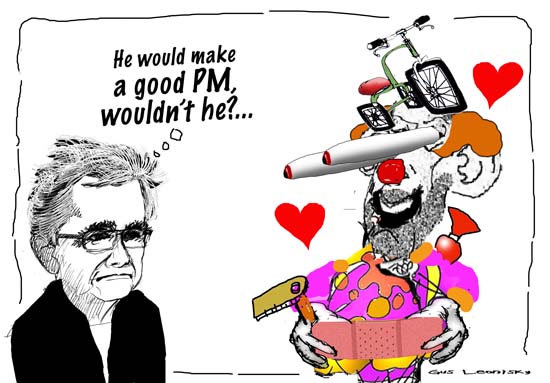Search
Recent comments
- bully don.....
2 hours 41 min ago - impeached?....
7 hours 28 min ago - 100.....
15 hours 41 min ago - epibatidine....
21 hours 32 min ago - cryptohubs...
22 hours 30 min ago - jackboots....
22 hours 38 min ago - horrid....
22 hours 46 min ago - nothing....
1 day 1 hour ago - daily tally....
1 day 2 hours ago - new tariffs....
1 day 4 hours ago
Democracy Links
Member's Off-site Blogs
losing at poker...

The office of Tasmanian independent MP Andrew Wilkie has confirmed he said Opposition Leader Tony Abbott would make a good Prime Minister.
Mr Wilkie is quoted in News Limited papers as declaring support for Mr Abbott's potential.
A spokeswoman says Mr Wilkie repaired his relationship with Mr Abbott last year.
Mr Wilkie has repeatedly threatened to withdraw support for the Federal Government if there is not progress towards putting restrictions on poker machines.
Asked about his comments, Prime Minister Julia Gillard said she would keep working with Mr Wilkie on problem gambling.
http://www.abc.net.au/news/stories/2011/04/24/3199377.htm?section=justin
-------------------------
Gus: I hope this is only a momentary lapse of concentration — or a smart ploy to toy with Tony-da-budgies or annoy Julia — from Andrew... Wilkie cannot forget that Tony was part of his master team that engineered the great con of the Iraq war, can he? Or is blinded by the brilliance of the bullshit that Tony exhuded from all pores, while dancing in a clown suit? Hitler would make a good PM as well, I have been told...
- By Gus Leonisky at 24 Apr 2011 - 6:37pm
- Gus Leonisky's blog
- Login or register to post comments
shut up and become smarter...
FEDERAL MPs are in revolt over what they say are unfair perks granted to the independents in a deal that delivered Labor a second shot at government.
As part of a binding agreement with the Gillard government, the key independents - Rob Oakeshott, Tony Windsor and Andrew Wilkie - were granted more than double the staffing entitlements of other backbenchers.
Parliamentary records show that on average each independent is endowed with enough public funds to pay nine electoral and personal parliamentary staff, whereas Liberal or Labor backbench MPs are allowed a staff of four.
Disgruntled MPs from both sides who contacted The Sun-Herald said the ''inordinate'' amount of attention and time given to the independents was beginning to disrupt the workings of Parliament and daily committee work. Their concerns included:
The level of access to cabinet ministers granted to the independent MPs.
Their own inability to secure meetings with the Prime Minister while independents were given a weekly audience when Parliament was in session.
Departmental briefings being rapidly made available to independents and not backbenchers.
A Labor MP, who did not want to be named, said he was aware independent and crossbench members held votes of significance for the government but rejected it as a reason for the ''outrageous hoopla that goes on each and every time an independent's name is involved''.
Read more: http://www.smh.com.au/national/mps-angry-over-trios-privileges-20110423-1ds53.html#ixzz1KQbY2Ka1
making a game out of it ...
Opposition to gambling has always been somewhat aesthetic and moralistic. The character of that moralising has, however, changed over time.
During the Middle Ages, betting was seen as unproductive and idle. Only knights, clergymen, and monarchs had sufficiently good character to be allowed to play dice for money.
A few hundred years later, Reformation era moralists saw gambling as sin. It was blasphemous to ask God to decide such trivial matters as dice throws.
Their Enlightenment descendants imagined gambling to be irrational; contrary to the spirit of the age of reason. The 19th century saw it as a social disorder; disruptive, inefficient, and, as a consequence, borderline criminal.
Anti-gambling activists of the early 20th century focused on class. The lower and upper orders played different games. Predictably and unfairly, working-class gambling was suppressed, and upper-class gambling left alone.
Today, the vast bulk of anti-gambling opinion has a medical hue. We now see gambling mostly through the prism of illness and addiction.
http://www.abc.net.au/unleashed/183000.html